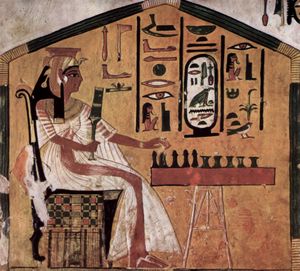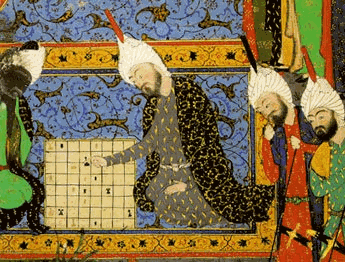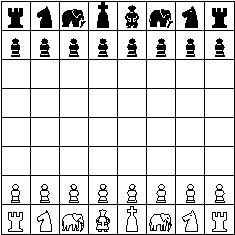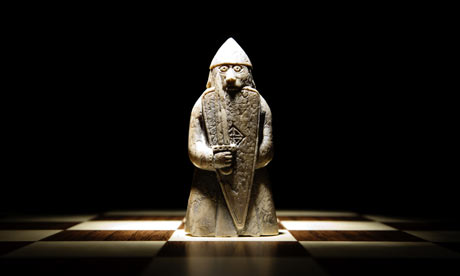Was Chess Invented in Ireland or China or India or…? November 5, 2012
Author: Beach Combing | in : Ancient, Medieval , trackback
There is a general consensus that chess came out of the east, that it arrived in Europe through the Arab Mediterranean and that from there it made its way to the royal courts of France and Germany. Certainly, by the fifteenth century a game that we recognise had come into being in the west. The truth is though that the origins of chess are more obscure than the origins of, say playing cards, which demonstrably arrived in Europe, directly or indirectly, from China.
The first problem is what we mean by ‘chess’. Of course, today we mean by that word rook, queen, king, pawn, checkmate, Bobby Fischer etc etc. But looking at all the games that appear on the family tree of chess (for example the Egyptian game at the head of this post or various Chinese competitors) it is necessary to speak rather more generically of: (i) a board game, (ii) that did not use dice and (iii) whose pieces had different values.
By this definition there were lots of different chesses in the ancient and medieval world. Take a random example, fidchell a Gaelic ‘chess’ described in old Irish sagas. Fidchell seems to have fulfilled these three conditions: there was a board, pieces were moved without dice, though there are still questions about the nature of the pieces used. Fidchell appears impossibly early in the sagas for it to have been influenced by any game from the east: unless we cook up a very exotic version of contact between pre-Patrician Ireland and the antique orient.
The only sensible way to chase down the history of chess is, as chess historians long ago understood, to follow the individual pieces of the modern game back into prehistory. And there most Chess historians prefer India as the chess Eden. There is, after all, the northern Indian game Chaturanga, the earliest references for which date back into the fifth and sixth centuries of our era. Chaturanga was played on an eight by eight tessellated board and had many of the pieces associated with modern chess: the raja (the king), the asva (the knight) etc etc But there is also bad news for the Indian claim. Crucially Chaturanga is not described in any detail at an early date: we rely on later versions of the game that may have been influenced by foreign equivalents. The Indian priority in chess is not as strong as many think.
It would be wonderful to argue here for, say, the Irish invention of chess: claiming that an early medieval peregrinus brought fidchell to Bombay and sparked off a gaming revolution. But India’s most likely rival as the originator of chess is nearby Persia. Persia – modern Iran – is usually seen as an intermediary in bringing chess to the west and China. But it could have been the centre from which the game spread to India. It is true that the game was known there as chatrang which clearly comes from chaturanga. But possibly a Persian borrowed the Indian (Sanskrit) word for ‘board game’ to describe his or her own invention and then, to follow the hypothesis through, Persian rules were borrowed for chaturanga.
Other chess words clearly come from Persian. The bishop was originally the alfil, an Arabic version of Persian pil or the ‘elephant’. Rook comes from the Persian rukh for chariot. Now the elephant and the chariot were never going to survive in western Europe and these were, naturally, changed to suit local mores. The alfil became our bishop and the chariot became, in most traditions, the rook or castle: though the famous Lewis chess set has, instead, Viking bezerkers who had, by the look of their eyes, eaten a bit too much fly agaric. Trust the medieval Hebrideans to create a board game where bishop and drugged up warriors from a pagan tradition played side by side… The Lewis chessmen are simply magnificent.
None of these Persian words, of course, demonstrate that chess came from Persia, any more than the very Italian word spaghetti suggests that pasta originated in Italy. But they are a reminder that the crown does not sit too firmly on the head of the Indian Raja. Can it actually be knocked off? drbeachcombing AT yahoo DOT com






